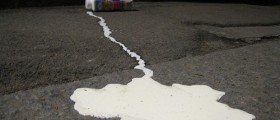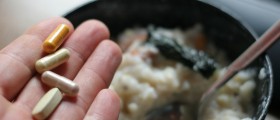
Lactose intolerance or dairy intolerance is a condition in which the body is not able to absorb lactose and results in gastrointestinal problems following the consumption of dairy products.
Lactose is a large sugar found in milk, that is composed of two smaller sugars-glucose and galactose. Intestine cannot absorb lactose before it splits in the two smaller sugars, which are then absorbed by the cells that are found in the lining of the small intestine.
The enzyme that is responsible for slitting lactose into glucose and galactose is called lactase. Lactase deficiency is the cause of lactose intolerance.
Lactase deficiency can be caused by congenital, secondary or developmental factors.
Some people are born with lactase deficiency and their symptoms start shortly after birth.
Secondary lactase deficiency is a result of diseases and conditions that damage the lining of the small intestine destroying the lactase.
Developmental causes are the most common and they are considered to be genetically programmed. After childhood there is a decrease of lactase, known as adult-type hypolactasia.
However, the lactase deficiency and lactose intolerance are not the same thing. It is not rare for the persons who have some level of lactase deficiency to not have any symptoms of lactose intolerance at all.
The symptoms of lactose intolerance affects the gastrointestinal tract. Those are primarily abdominal pain, diarrhea, flatulence (gas), and the less common symptoms includes abdominal bloating, distention and nausea.
These symptoms are characteristic for other gastrointestinal conditions as well so it is not that easy to diagnose lactose intolerance based only on them.
The symptoms are caused by passing of the unabsorbed lactose from the small intestine into the colon. Colon contains bacteria that contain lactase, which enables them to split the lactose and use the glucose and galactose for their own purposes. The byproduct of this process is hydrogen gas, which is expelled from the body through lungs (in breath) but a small portion leaves directly from the colon and it is known as flatulence.
However, not all the lactose in the colon gets splits. Some of it remains whole and attracts water in the colon, causing loose stool or diarrhea.
The intensity of the symptoms of lactose intolerance is different from person to person. Some persons have less dairy products in their diet and thus they have milder or more rare symptoms. Also, the grade of lactase deficiency, which goes from mild to severe, is different in each person and determines the amount of symptoms.

















Your thoughts on this
Loading...